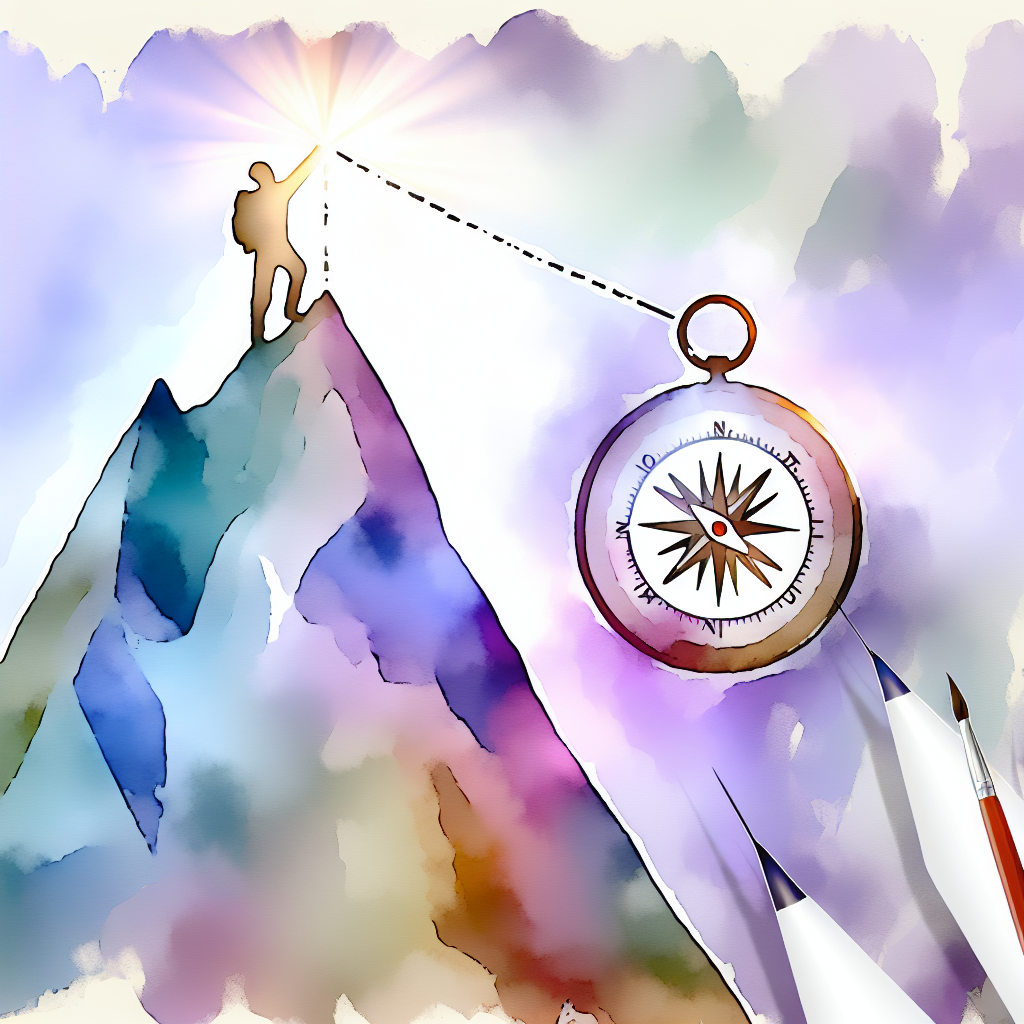How to Stay Consistent with Personal Development Goals for Long-Term Success

In the pursuit of personal growth and long-term success, individuals often encounter the challenge of maintaining consistency with their personal development goals. In a world bustling with distractions, the journey towards self-improvement requires a steadfast commitment, strategic planning, and a willingness to adapt. Personal development is not merely a destination but a continuous process that, when nurtured, leads to profound and sustaining change.
Setting clear personal development goals is foundational in this journey. It is not just about aspiring to be a better version of yourself but about understanding what that version looks like. This clarity sets the stage for a focused approach to self-improvement. However, while setting goals is essential, the methods employed to achieve them determine success.
In our fast-paced world, where time is scarce and distractions are plenty, leveraging tools and techniques to maintain focus can bridge the gap between goals and achievement. Mindfulness practices, accountability partnerships, and technological aids are just a few strategies that can enhance consistency. The integration of these tools into daily life not only fosters personal growth but also provides a roadmap to navigate obstacles along the way.
As you advance in your personal development journey, embracing flexibility and adaptability is crucial. Goals may evolve as you do, and maintaining motivation through acknowledging small victories keeps the momentum alive. This article delves into strategies for staying consistent with personal development goals, ensuring that your pursuit of personal growth yields significant long-term success.
Understanding the Importance of Setting Clear Personal Development Goals
Personal development begins with a clear vision of what you aim to achieve. Setting defined goals provides direction and enables you to channel your energies effectively. It serves to clarify your intentions, offering a roadmap that guides your actions.
Clear goals help to create a sense of purpose, leading to increased motivation. Without them, your efforts may become aimless and haphazard. It’s essential to outline specific objectives so that you can measure progress over time. For example, instead of aiming to “read more,” specify reading “one book per month.”
Moreover, having clear goals allows for better prioritization. In understanding the importance of each goal, you can allocate time and resources efficiently, ensuring consistent progress towards personal growth. Structured goals help in breaking down your vision into actionable steps that prevent overwhelm.
Creating a Vision Board to Visualize Your Personal Growth Goals
A vision board is a powerful tool that can bring your goals to life. By offering a visual representation of your aspirations, it serves as a constant reminder of what you are working toward. Creating one can be a reflective exercise that brings clarity to your desires.
To start building a vision board, gather materials such as magazines, photographs, and online images that resonate with your personal growth ambitions. Arrange these visuals in a way that makes sense to you, ensuring that each image sparks motivation. The process of selecting and organizing images aids in solidifying your goals mentally.
The completed vision board should be displayed prominently in a space where you can view it daily. This constant visual cue not only helps maintain focus on your goals but also inspires action. It acts as a silent coach, urging you to strive for the developments it represents.
Developing a Strategic Plan with Measurable Milestones
Once your goals are clear and visioned, the next step is to devise a strategic plan that outlines how these goals will be achieved. A strategic plan should encompass both short-term and long-term elements, aligning them with measurable milestones that track your progress.
Start by defining what success looks like for each goal and identify key milestones along the way. Break down each goal into smaller, achievable tasks, thus making the entire process less daunting. Establish timelines for these tasks, creating a structured path to follow.
Moreover, it is crucial to incorporate flexibility into your plan, allowing for adjustments as necessary. Life is unpredictable, and so is personal development. Being adaptable ensures that unexpected changes do not derail your progress, but rather, are incorporated into your growth strategy.
Incorporating Daily Habits to Foster Personal Growth
Daily habits play a crucial role in achieving consistency in personal growth. They form the backbone of your development strategy, embedding positive actions into your routine. Start by identifying habits that align with your goals and can be seamlessly integrated into your daily life.
Some effective daily habits for personal growth include:
- Morning Journaling: Reflect on your goals and set daily intentions.
- Reading or Learning: Dedicate time to expanding your knowledge.
- Physical Activity: Engage in exercise to boost mental and physical well-being.
- Mindfulness Practice: Spend a few minutes meditating or reflecting.
Implementing these habits requires discipline and commitment. Begin with one or two changes at a time, allowing each to become a part of your daily routine before adding more. Over time, these small, consistent actions cumulatively lead to significant growth.
Utilizing Mindfulness Techniques to Maintain Focus on Goals
Mindfulness techniques are essential tools in maintaining focus on your personal development objectives. They enhance self-awareness, reduce stress, and improve concentration, all of which are vital for staying committed to your goals.
Techniques such as meditation, deep breathing exercises, and mindful journaling help center your thoughts and keep you grounded in the present. This focus reduces distractions and allows you to engage more fully with the tasks at hand.
Moreover, regular mindfulness practice fosters a mindset that embraces challenges and setbacks as opportunities for growth rather than barriers. It instills patience and resilience, qualities that are imperative to achieve personal growth goals.
Staying Accountable: Finding a Mentor or Accountability Partner
Accountability can significantly boost your ability to stay consistent with your personal development goals. Having someone to share your journey with provides both motivation and a support system that encourages perseverance.
Finding a mentor or an accountability partner can help you remain committed. A mentor offers guidance based on their experiences, providing insights into potential obstacles and how they can be overcome. An accountability partner, on the other hand, shares in the journey, offering mutual support and motivation.
Set regular check-ins with your accountability partner or mentor to discuss progress, challenges, and triumphs. This relational approach not only maintains motivation but also provides different perspectives that can enrich your personal growth journey.
Leveraging Technology: Apps and Tools to Track Progress
In today’s digital age, technology offers various tools to assist in tracking and managing personal development goals. Apps designed for habit tracking, goal setting, and productivity can make a significant difference in maintaining consistency.
Some popular apps include:
| App Name | Purpose | Features |
|---|---|---|
| Habitica | Habit tracking | Uses gamification to motivate users. |
| Trello | Project management | Board-based system for task organization. |
| Headspace | Mindfulness | Guided meditations and relaxation techniques. |
Leverage these tools to set reminders, track progress, and visualize your development journey. They provide structure and data to assess your efforts, making it easier to adjust strategies and celebrate achievements.
Overcoming Common Obstacles in Personal Development
Challenges and obstacles are inherent in any personal development journey. However, recognizing and tackling these obstacles ensure continued progress. Common obstacles include lack of motivation, time constraints, and fear of failure.
Lack of motivation can be addressed by revisiting your vision board or engaging with your support network. Keeping your goals visible and discussing them regularly can reignite passion and drive.
Time constraints are another common hurdle. Prioritize your goals by scheduling specific times dedicated to your development, treating them as non-negotiable appointments.
Lastly, fear of failure often stalls progress. Cultivate a growth mindset by viewing failures as learning opportunities. Each setback offers valuable insights that contribute to your long-term success strategies.
Adjusting Your Goals as You Grow: Embracing Flexibility
As you embark on your personal growth journey, it’s crucial to remain open-minded and flexible. Personal development is an evolving process where goals may need adjusting as you learn and grow.
Review your goals periodically to ensure they remain aligned with your evolving aspirations. New insights and experiences may lead to adjustments in your objectives or timelines. Embrace these changes as a natural part of your development journey.
Flexibility not only prevents stagnation but also allows for creativity and innovation in your approach to achieving personal development goals. It fosters adaptability, a skill that is invaluable throughout life’s various phases.
Celebrating Small Wins to Keep Motivation High
Recognition of progress, no matter how small, is vital for sustaining motivation. Celebrating small victories acknowledges your efforts and reinforces the positive actions taken towards larger goals.
Create a system for tracking and celebrating achievements. It could be as simple as marking milestones on a calendar or rewarding yourself with a treat. These celebrations serve as reminders that you are advancing, building a positive reinforcement cycle that keeps you motivated.
Regularly reflecting on your wins reminds you of your capability and advances your commitment to personal development consistency. It fosters an optimistic outlook and energizes your journey towards achieving personal growth goals.
Reflecting Regularly: Evaluating Your Progress and Making Necessary Adjustments
Regular reflection on your personal development journey is imperative for growth. Schedule periodic evaluations to assess your progress towards your goals. This evaluation process allows you to identify successes, recognize areas for improvement, and adjust strategies accordingly.
Consider keeping a journal or log to document your experiences, thoughts, and feelings throughout the process. This record provides valuable insight into your journey and helps identify patterns in your behavior that affect your progress.
Adjustments based on these reflections ensure that your personal development journey remains aligned with your goals and aspirations. It is a dynamic process that evolves as you do, providing the clarity and direction needed for long-term success.
FAQ
1. How do I start setting personal development goals?
Begin by introspecting on what aspects of your life you want to improve. Define your core values and aspirations, then formulate specific, measurable, achievable, relevant, and time-bound (SMART) goals based on these insights.
2. Why is consistency important in personal development?
Consistency transforms short-term efforts into long-term habits. It ensures sustained progress by embedding positive actions within your daily routine, leading to lasting change.
3. How can I overcome a lack of motivation in my personal growth journey?
To overcome lack of motivation, reconnect with your initial “why,” revisit your vision board, and engage with supportive accountability partners or mentors who can provide encouragement and perspective.
4. What role does technology play in personal development?
Technology offers tools that aid in organization, tracking, and maintaining accountability. Apps for habit tracking, goal setting, and mindfulness provide convenient platforms to support your development journey.
5. How often should I reassess my personal development goals?
Reassess your goals regularly, ideally every few months, or when you experience significant life changes. This ensures your goals stay relevant and aligned with your evolving mindset and circumstances.
Recap
Staying consistent with personal development goals requires clear goal setting, strategic planning, and the incorporation of daily habits. Utilizing mindfulness techniques can help maintain focus, while accountability partnerships provide external motivation. Technology serves as a valuable tool in tracking progress and overcoming obstacles. As growth is continuous, embracing flexibility and celebrating small victories are essential. Regular reflection allows for necessary adjustments, ensuring that your personal development journey remains aligned to your aspirations.
Conclusion
The journey towards personal development is a lifelong endeavor that demands persistence, discipline, and adaptability. Clear goals offer a roadmap, providing direction and purpose that guide your actions. Strategic planning and incremental progress through measurable milestones ensure that you remain on course.
Incorporating tools like mindfulness techniques, accountability partners, and technology aids in maintaining consistency and focus. They transform your aspirations into actionable steps, weaving personal growth seamlessly into your daily life.
Ultimately, personal development is about the journey rather than the destination. Embrace each step, each challenge, and each success as part of a broader narrative of self-improvement. By remaining committed and flexible, you foster a cycle of growth that leads to lasting transformation and long-term success.
References
- Dweck, C. (2006). Mindset: The New Psychology of Success. Random House.
- Clear, J. (2018). Atomic Habits: An Easy & Proven Way to Build Good Habits & Break Bad Ones. Avery.
- Senge, P. (1990). The Fifth Discipline: The Art & Practice of The Learning Organization. Doubleday.

James Carter is a financial writer and consultant with expertise in economics, personal finance, and investment strategies. With years of experience helping individuals and businesses navigate complex financial decisions, James provides practical insights and analysis. His goal is to empower readers with the knowledge they need to achieve financial success.





